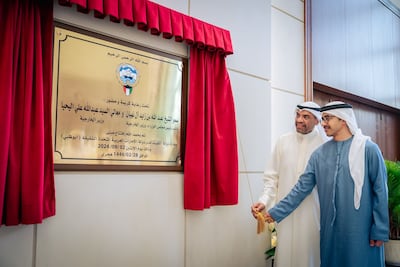They may be opposite ends of the Arabian Gulf but the UAE and Kuwait have always maintained a close relationship.
That bond of friendship was clearest in the first Gulf War and Saddam Hussein’s invasion, when the UAE opened its doors to thousands of Kuwaitis fleeing Iraqi forces and then joined the international coalition to liberate Kuwait, sending troops and aircraft to join the fight. The lives of Emirati soldiers lost in the battle to liberate Kuwait are today inscribed on the Wahat Al Karama memorial.
Much of the credit for the strength of this relationship can be traced back to the earliest days of the UAE, when Founding Father, the late Sheikh Zayed bin Sultan Al Nahyan, met the late ruler of Kuwait, Sheikh Jaber Al Ahmad Al Sabah, back in 1973. Two years earlier, Kuwait was among the first countries to recognise the new United Arab Emirates on its founding in December 1971.
This friendship has been maintained by successive UAE Presidents from Sheikh Khalifa to Sheikh Mohamed and the Emir of Kuwait, Sheikh Meshal Al Ahmad, who is to host Sheikh Mohamed in a state visit starting on Sunday.
Strong ties
In March, President Sheikh Mohamed awarded Sheikh Meshal the Order of Zayed during his state visit to the UAE, as a reflection of the strong ties between the two countries, and Sheikh Meshal’s efforts to build them further. In particular, the citation praised Sheikh Meshal’s work to build solidarity among members of the Gulf Co-operation Council, of which both countries have been members since it was founded in Abu Dhabi in 1981.
In 2006, a Joint Committee for Bilateral Co-operation was established between the UAE and Kuwait, meeting first in Kuwait City and two years later in Abu Dhabi. Subsequent meetings have seen numerous agreements, from diplomatic training and industrial co-operation to culture, arts and libraries, and a Memorandum of Understanding for co-operation in oil, gas and renewable energy in 2014.

The following year saw the first session of a Consular Committee to explore joint areas of diplomacy. An international studies programme developed by both countries seeks to encourage students to choose colleges and universities within the GCC countries rather than further overseas. That interest in education can be traced back as far as 1952 and a visit by the late Emir of Kuwait Sheikh Abdullah Al Salem Al Sabah to Sharjah, which led to an educational mission being sent to the emirates. According to Wam, 1,725 Kuwaiti students are enrolled at UAE universities.
This was followed by a medical mission in 1962, at a time when hospitals and medical care were still in their infancy in the seven emirates, while Kuwait TV set up a station in Dubai in 1969.
In numbers
Today, the UAE is the largest Arab exporter to Kuwait, with goods valued at Dh47.75 billion (US$13 billion) in 2022, led by gold and jewellery, and growing by more than 27 per cent since 2017.
In return, Kuwait exports goods worth Dh12.6 billion (US$3.43 billion) to the UAE, including refined petroleum and cars and light lorries. In 2022, state news agency Wam reported that bilateral trade between the nations had risen to Dh43 billion over a 10-year period.
More than 50 Kuwaiti companies now invest in the UAE, while over 381,000 Kuwaiti tourists visited the UAE in 2023, compared to 250,000 the previous year. In the other direction, about 50,000 Emiratis visited Kuwait last year, with the country now hosting over 130 UAE companies. National carriers operated 122 weekly flights to Kuwait during the first half of this year, while the total flights from Kuwait to the UAE reached 53 weekly, according to Wam.
“Our bilateral non-oil trade has seen significant growth in recent years, reaching its highest levels in history in 2023, with a total value exceeding $12 billion,” said Sheikh Abdullah bin Zayed, Deputy Prime Minister and Minister of Foreign Affairs, in September at the opening of the new Kuwaiti Embassy in Abu Dhabi.
That emphasis on building trade saw a number of key agreements in 2024. At the fifth UAE-Kuwait Joint Higher Committee meeting in Abu Dhabi last September, no less than eight MoUs were signed, covering areas including telecoms and information technology, education, sports, cyber security, defence and culture.
The agreements were described by Sheikh Abdullah as embodying “the depth of the fraternal relations between the two countries”.
He added: “What most distinguishes the UAE-Kuwait relations, and their continuous development, are the social and cultural bonds that unite the two brotherly peoples, including the ties of brotherhood and friendship, shared heritage, history and common values.”


